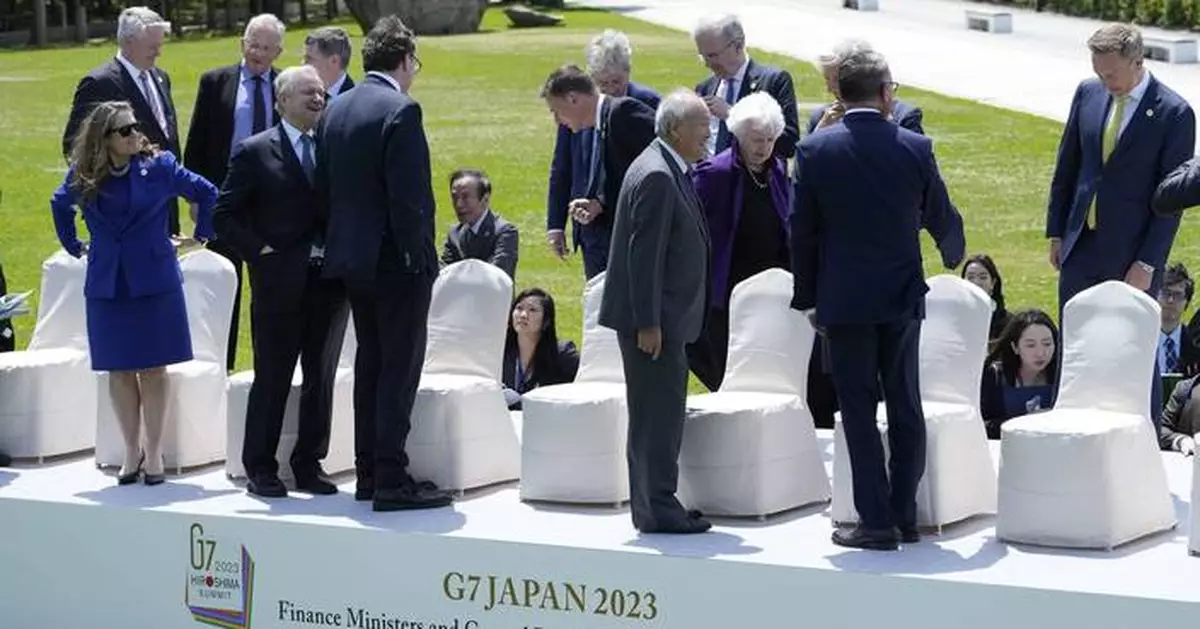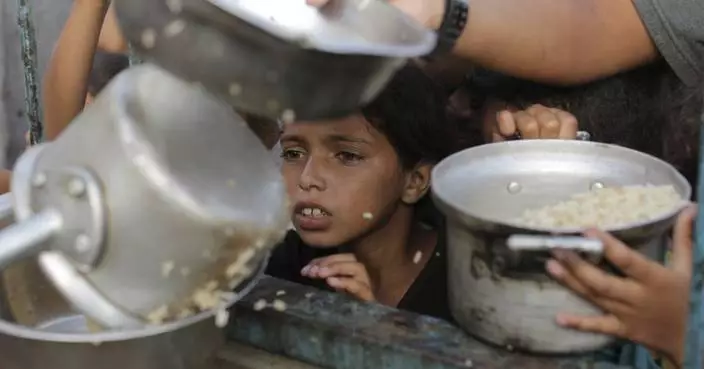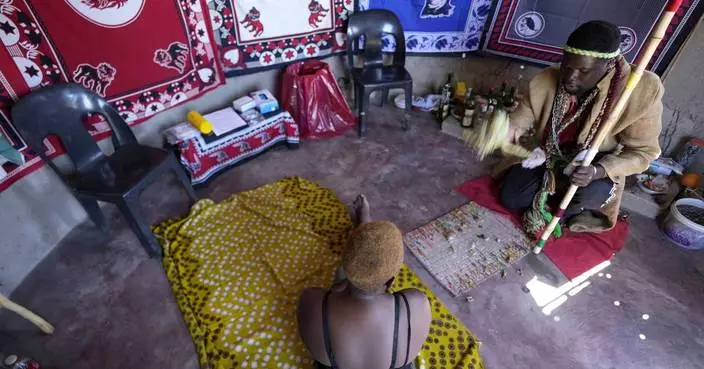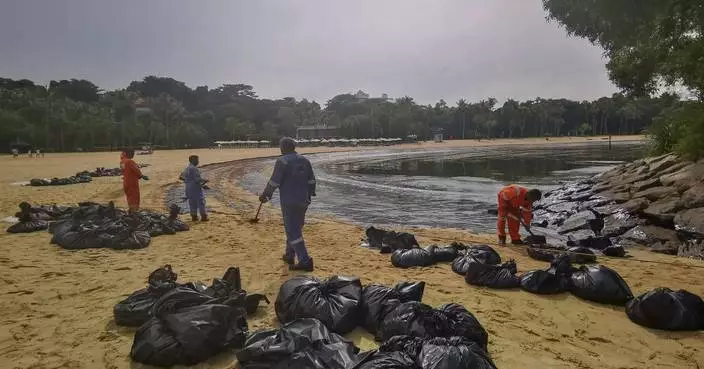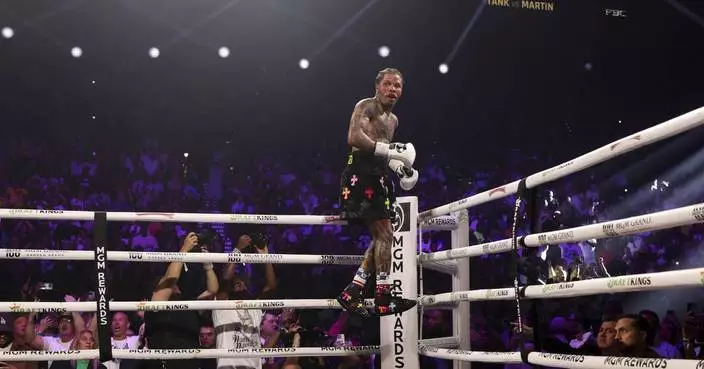FRANKFURT, Germany (AP) — Ukraine's allies are wrestling with how to squeeze money out of frozen Russian assets to support Kyiv's war effort, a debate that is ever more urgent as Russia gains territory on the battlefield and as the outlook for Ukraine’s state finances looks shakier.
What to do with the Russian central bank reserves frozen in response to the invasion of Ukraine is at the top of the agenda as finance officials from the Group of Seven rich democracies meet Thursday through Saturday in Stresa, Italy, on the shores of scenic Lago Maggiore.
The issue: Ukraine and many of its supporters have called for the confiscation of $260 billion in Russian assets frozen outside the country after the Feb. 24, 2022, invasion. But European officials have resisted, citing legal and financial stability concerns. And most of the frozen assets are located in Europe.
A European plan to merely use the interest on the Russian funds would provide only a trickle of money every year — some $2.5 billion-$3 billion at current interest rates. That would barely meet a month's financing needs for the Ukrainian government.
U.S. Treasury officials and outside economists are proposing ways to turn that annual trickle into a much larger chunk of upfront cash. That could done be through a bond that would be repaid by the future interest income, giving Ukraine the money immediately. The ministers meet with Ukrainian Finance Minister Sergii Marchenko on Saturday.
“Securing Ukraine’s position in the medium-to-long term requires unlocking the value of immobilized Russian sovereign assets,” U.S. Treasury Secretary Janet Yellen said at a news conference Thursday in Stresa. “We support the EU’s decision to utilize the windfall profits from these assets, but we must also continue our collective work on more ambitious options.”
She said $50 billion “has been mentioned as a possible number that could be achieved” from the assets, but that the specific approach was still under discussion.
The debate over the Russian assets is being revived after President Joe Biden in April signed into law the Rebuilding Economic Prosperity and Opportunity for Ukrainians Act, which allows the administration to seize the roughly $5 billion in Russian state assets located in the U.S. The law was included in the U.S. aid package for Ukraine and other nations, which includes roughly $61 billion for Ukraine’s defense.
Exactly what the income from Russian assets would be spent on remains open, but one key focus is Kyiv's state budget. Ukraine spends almost the entirety of its tax revenue on the military and needs another $40 billion a year to continue paying old-age pensions and the salaries of doctors, nurses and teachers — the glue that holds society together under dire wartime circumstances. Support from allies and a $15.4 billion loan from the International Monetary Fund was initially thought to have secured the budget for four years, but the prospects of an extended conflict have darkened the outlook.
Ukraine depends on its allies for that money because the war keeps the government from accessing international bond market borrowing. The alternative would be printing money at the central bank, which risks igniting hyperinflation.
Thanks to EU support and the U.S. aid package, passed after months of delay, this year’s budget “looks decent in terms of budget financing” but “next year is going to be much more challenging,” said Benjamin Hilgenstock, senior economist at the Kyiv School of Economics Institute.
The ministers will seek to build consensus ahead of the June 13-15 summit of G7 national leaders summit in Italy.
Yellen will also raise China’s outsized, state-backed production of green energy technology, which the U.S. considers a threat to the global economy. It has been a little more than a month since she traveled to China to speak with her counterparts in Guangzhou and Beijing about the nation’s massive subsidies to its electric vehicles, batteries, solar energy equipment and other products.
Since then, the U.S. has imposed major new tariffs on electric vehicles, semiconductors, solar equipment and medical supplies imported from China. Included is a 100% tariff on Chinese-made EVs, meant to protect the U.S. economy from cheap Chinese imports.
Yellen said Chinese overcapacity was an issue not just for the U.S. but also for other G7 and developing countries. That's because China's selling of low-priced goods threatens the existence of competing companies around the world, she said. “We are not willing to be completely reliant on China as a provider of these goods," she said.
"We need to stand together and send a unified message to China so they understand that it is not just one country that feels this way but that they face a wall of opposition to this strategy that they are pursuing.”
Yellen said the finance ministers would also discuss humanitarian aid for Gaza, and that she would urge other member governments to join in strengthening sanctions against Iran over support of terrorist groups.
The G7 meets annually to coordinate economic policy and discuss other issues including security and energy. Its members are Canada, France, Germany, Italy, Japan, the United Kingdom and the United States. Representatives of the European Union also take part, but the EU does not serve as one of the rotating chairs.
Follow AP's coverage at https://apnews.com/hub/russia-ukraine
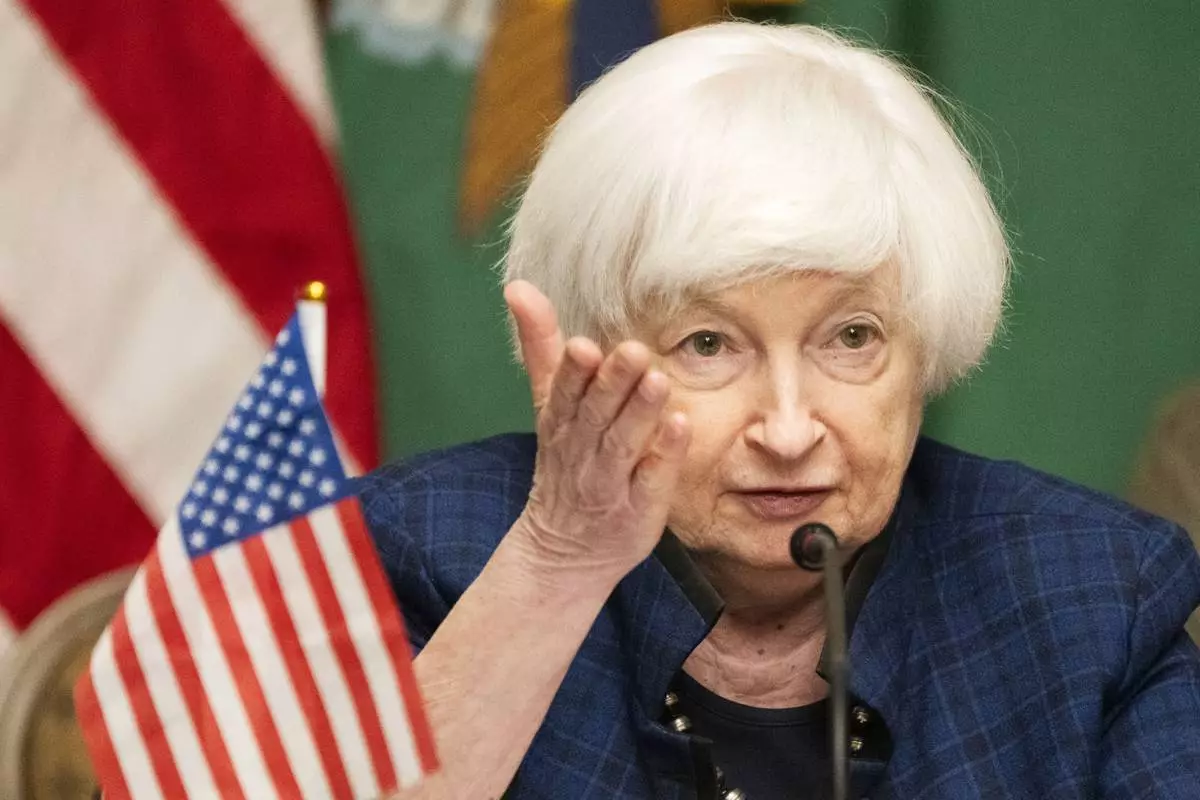
FILE - Treasure Secretary Janet Yellen speaks during an American Partnership for Economic Prosperity meeting with finance ministers at the Treasury Department, on April 19, 2024, in Washington. What to do with the Russian central bank reserves frozen in response to the invasion of Ukraine is at the top of the agenda as finance officials from the Group of Seven rich democracies meet Thursday through Saturday in Stresa, Italy, on the shores of scenic Lago Maggiore. “Securing Ukraine’s position in the medium-to-long term requires unlocking the value of immobilized Russian sovereign assets,” U.S. Treasury Secretary Janet Yellen said. (AP Photo/Jacquelyn Martin, File)
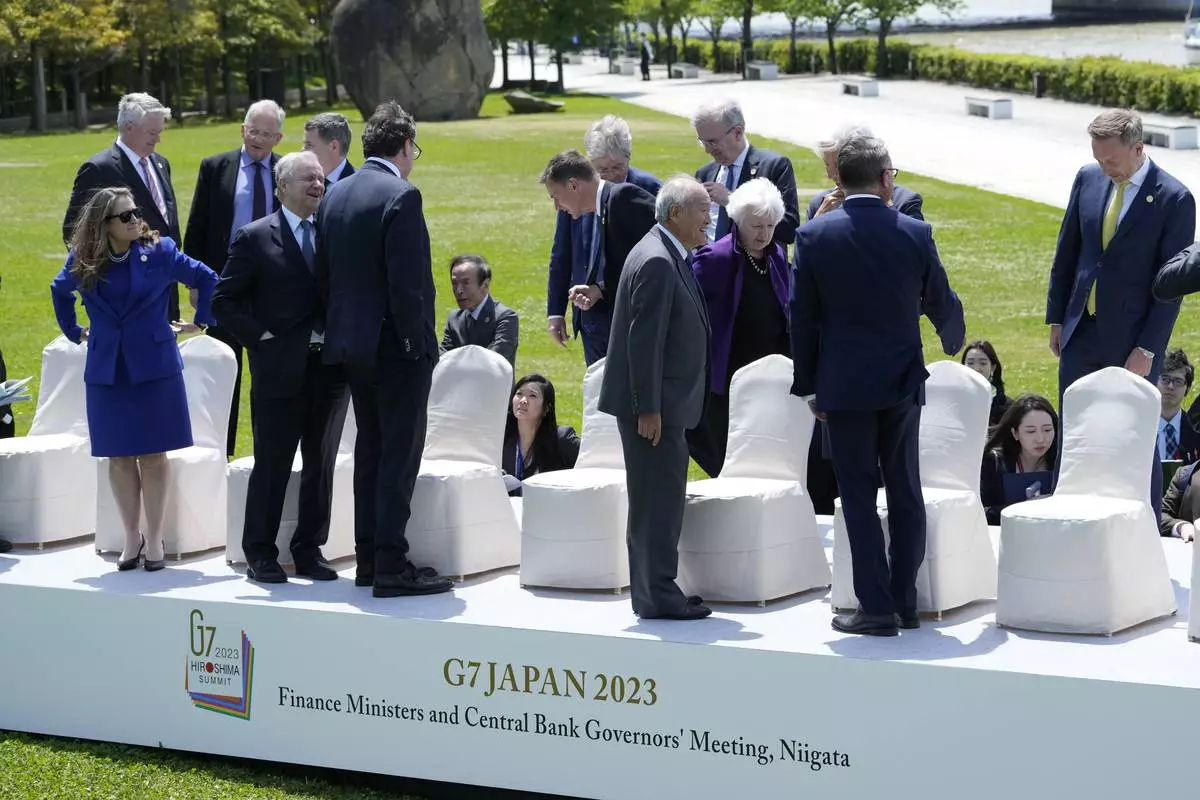
File - G7 finance ministers and central bank governors arrive for a group photo at their meeting in Niigata, Japan, on May 12, 2023. G7 finance ministers will gather in Stresa, Italy, May 24-25, 2024, in search of ways to squeeze more money for Ukraine out of Russian central bank assets frozen in Europe and the U.S. (AP Photo/Shuji Kajiyama, File)
MELBOURNE, Australia (AP) — Chinese Premier Li Qiang's visit to Australia on Sunday focused on positive aspects of the bilateral relationship including shared giant pandas and a rebounding wine trade as he promised a new breeding pair of the rare bears and urged both countries to put aside their differences.
China’s most powerful leader after President Xi Jinping arrived late Saturday in Adelaide, the capital of South Australia state, which has produced most of the Australian wine entering China since crippling tariffs were lifted in March that had effectively ended a 1.2 billion Australian dollar ($790 million) a year trade since 2020.
Li visited Adelaide Zoo, which has been home to China-born giant pandas Wang Wang and Fu Ni since 2009, before he was to have lunch at a restaurant at Adelaide winery Penfolds Magill Estate.
He announced that the zoo would be loaned another two pandas after the pair are due to return to China in November.
“China will soon provide another pair of pandas that are equally beautiful, lively, cute and younger to the Adelaide Zoo, and continue the cooperation on giant pandas between China and Australia,” Li said in Mandarin, adding that zoo staff would be invited to "pick a pair.”
Li was impressed by the 18-year-old male Wang Wang's appetite and indifference to his high-ranking visitors.
“The panda is very obsessed with eating and doesn’t pay attention to us even when we are the people from its hometown visiting,” Li said at the panda enclosure.
“It has completely treated here as its second hometown,” Li said. "Very pretty, adorable, with charming naivety.”
The pair are the only pandas in the Southern Hemisphere and failed to produce offspring in Australia.
Foreign Minister Penny Wong thanked Li for ensuring that pandas would remain the zoo's star attraction.
“It’s good for the economy, it’s good for South Australian jobs, it’s good for tourism, and it is a signal of goodwill, and we thank you,” Wong said.
Tom King, the managing director of Penfolds, one of Australia's oldest wineries, told Chinese state media ahead of Li’s arrival that such visits helped strengthen economic and cultural ties.
“It’s pleasing to see the stabilizing of relations between the Australian and Chinese governments, including regular high-level visits between the two countries,” King was quoted as saying by the Global Times newspaper last week.
Li's visit is the first to Australia by a Chinese premier in seven years and marks an improvement in relations since Prime Minister Anthony Albanese’s center-left Labor Party was elected in 2022.
Li noted that Albanese in November was the first Australian prime minister to visit China since 2016.
“China-Australia relations were back on track after a period of twists and turns, generating tangible benefits to the people of both countries,” Li said, according to a translation released by the Chinese Embassy in Australia on Sunday.
“History has proven that mutual respect, seeking common ground while shelving differences and mutually beneficial cooperation are the valuable experience in growing China-Australia relations, and must be upheld and carried forward,” Li added.
Hundreds of pro-China demonstrators, human rights protesters and democracy activists gathered outside the zoo before Li’s visit.
Among the protesters was former Hong Kong lawmaker Ted Hui, who fled to Australia three years ago to avoid a prison sentence for his activism. He said the panda offer was a cynical move to soften China's image and to distract from the government's human rights failings.
“It's a public relations move by the Chinese regime and, disappointingly, the Australian government is reciprocating by welcoming him and shaking hands,” Hui said.
Hui said Li showed cowardice by entering the zoo by a rear entrance while most of the protesters and China supporters had gathered at the main entrance. But Hui and other protesters were able to shout slogans at Li from a distance inside the zoo.
China initiated a reset of the relationship after the previous conservative administration's nine years in power ended.
Relations collapsed over legislation that banned covert foreign interference in Australian politics, the exclusion of Chinese-owned telecommunications giant Huawei from rolling out the national 5G network due to security concerns, and Australia’s call for an independent investigation into the causes of and responses to the COVID-19 pandemic.
Beijing imposed an array of official and unofficial trade blocks in 2020 on a range of Australian exports including coal, wine, beef, barley and wood that cost up to AU$20 billion ($13 billion) a year.
All the trade bans have now been lifted except for Australian live lobster exports. Trade Minister Don Farrell predicted that impediment would also be lifted soon after Li’s visit with Chinese Commerce Minister Wang Wentao.
Wong said Li’s visit was the result of “two years of very deliberate, very patient work by this government to bring about a stabilization of the relationship and to work towards the removal of trade impediments.”
“We will cooperate where we can, we will disagree where we must and we will engage in our national interest,” Wong told Australian Broadcasting Corp. before joining Li for lunch.
Li’s agenda becomes more contentious after he left Adelaide late Sunday for meetings in the national capital, Canberra, on Monday and a Chinese-controlled lithium processing plant in resource-rich Western Australia state on Tuesday.
Albanese has said he will raise with Li during an annual leaders’ meeting recent clashes between the two countries’ militaries in the South China Sea and Yellow Sea that Australia argues endangered Australian personnel.
Albanese will also raise the fate of China-born Australian democracy blogger Yang Hengjun, who was given a suspended death sentence by a Beijing court in February. Australia is also concerned for Hong Kong-Australia dual national Gordon Ng, who was among 14 pro-democracy activists convicted by a Hong Kong court last month for national security offenses.
Li’s visit to Tianqi Lithium Energy Australia’s processing plant south of the Western Australia capital of Perth will underscore China’s interest in investing in critical minerals. The plant produces battery-grade lithium hydroxide for electric vehicles.
Australia shares the United States’ concerns over China’s dominance in the critical minerals, which are essential components in the world’s transition to renewable energy sources.
Citing Australia’s national interests, Treasurer Jim Chalmers recently ordered five Chinese-linked companies to divest their shares in the rare earth mining company, Northern Minerals.
Asked if Chinese companies could invest in processing critical minerals in Australia, Wong replied that Australia’s foreign investment framework was “open to all.”
“We want to grow our critical minerals industry,” Wong said.
Australia is the second stop of Li’s tour after New Zealand, and will end in Malaysia.
AP video producer Caroline Chen and journalist Ken Moritsugu contributed from Beijing.
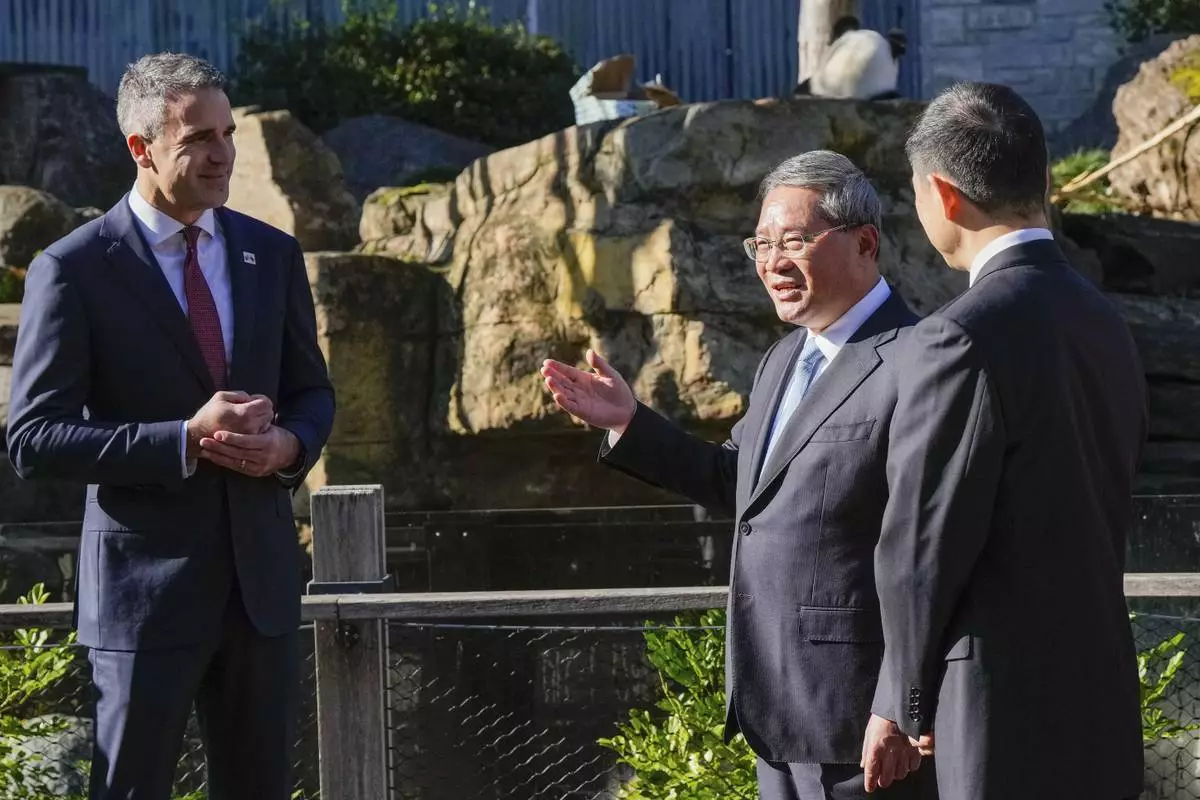
China's Premier Li Qiang gestures as South Australian Premier Peter Malinauskas, left, watches at Adelaide Zoo, Australia, Sunday, June 16, 2024. Li is on a relations-mending mission with panda diplomacy, rock lobsters and China's global dominance in the critical minerals sector high on the agenda during his four day visit to Australia. (Asanka Brendon Ratnayake/Pool Photo via AP)
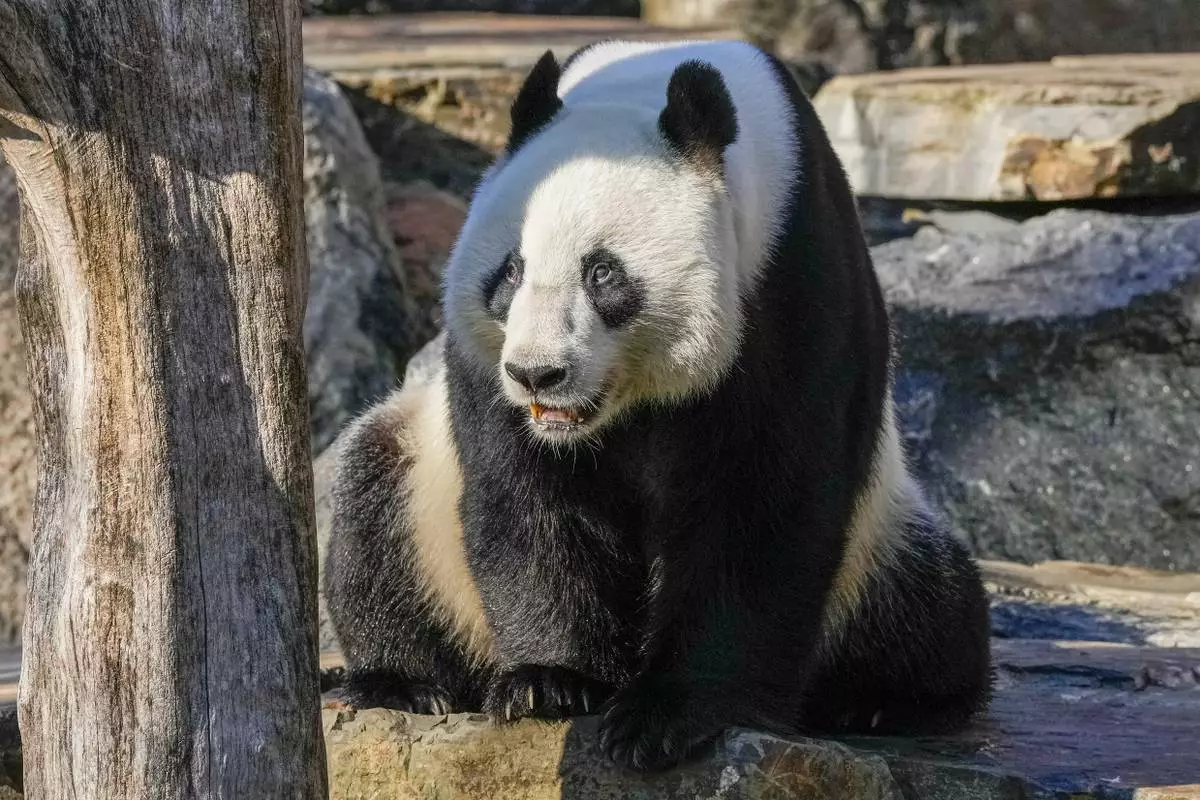
Wang Wang, a giant panda, walks around its enclosure during a visit by Chinese Premier Li Qiang at Adelaide Zoo, Australia, Sunday, June 16, 2024. (Asanka Brendon Ratnayake/Pool Photo via AP)
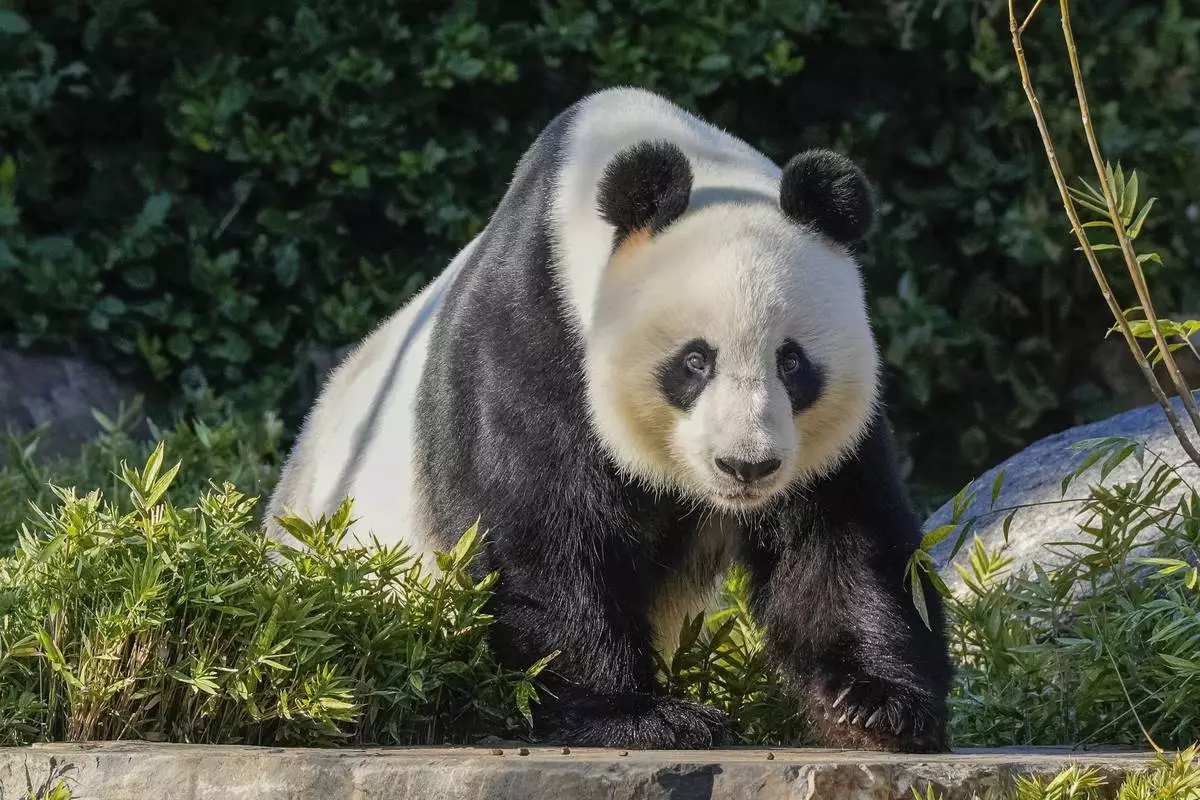
Wang Wang, a giant panda, walks around its enclosure during a visit by Chinese Premier Li Qiang at Adelaide Zoo, Australia, Sunday, June 16, 2024. (Asanka Brendon Ratnayake/Pool Photo via AP)
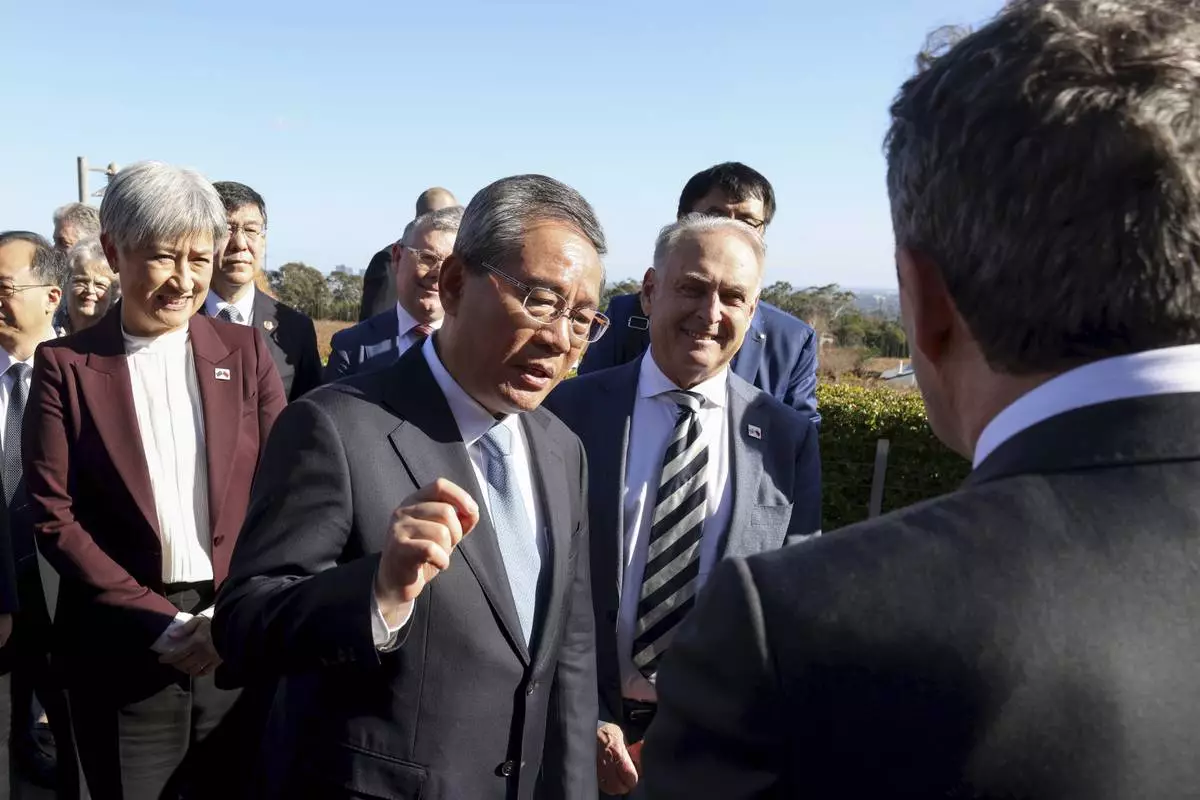
Chinese Premier Li Qiang, center, talks with Penfolds winemaker Peter Gago, right, at Magill Estate winery in Adelaide, Australia, Sunday, June 16, 2024. (AP Photo/Kelly Barnes, Pool)
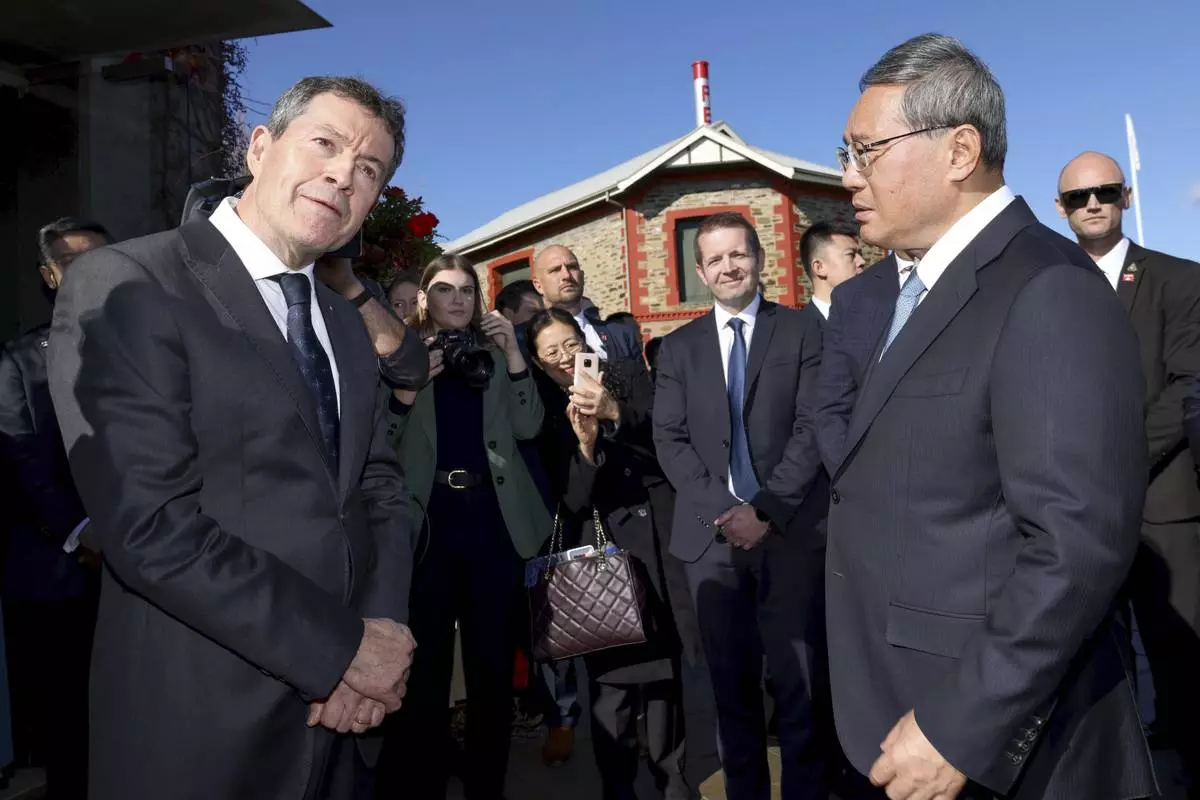
Chinese Premier Li Qiang, front right, talks with Penfolds winemaker Peter Gago, left, at Magill Estate winery in Adelaide, Australia, Sunday, June 16, 2024. (AP Photo/Kelly Barnes, Pool)
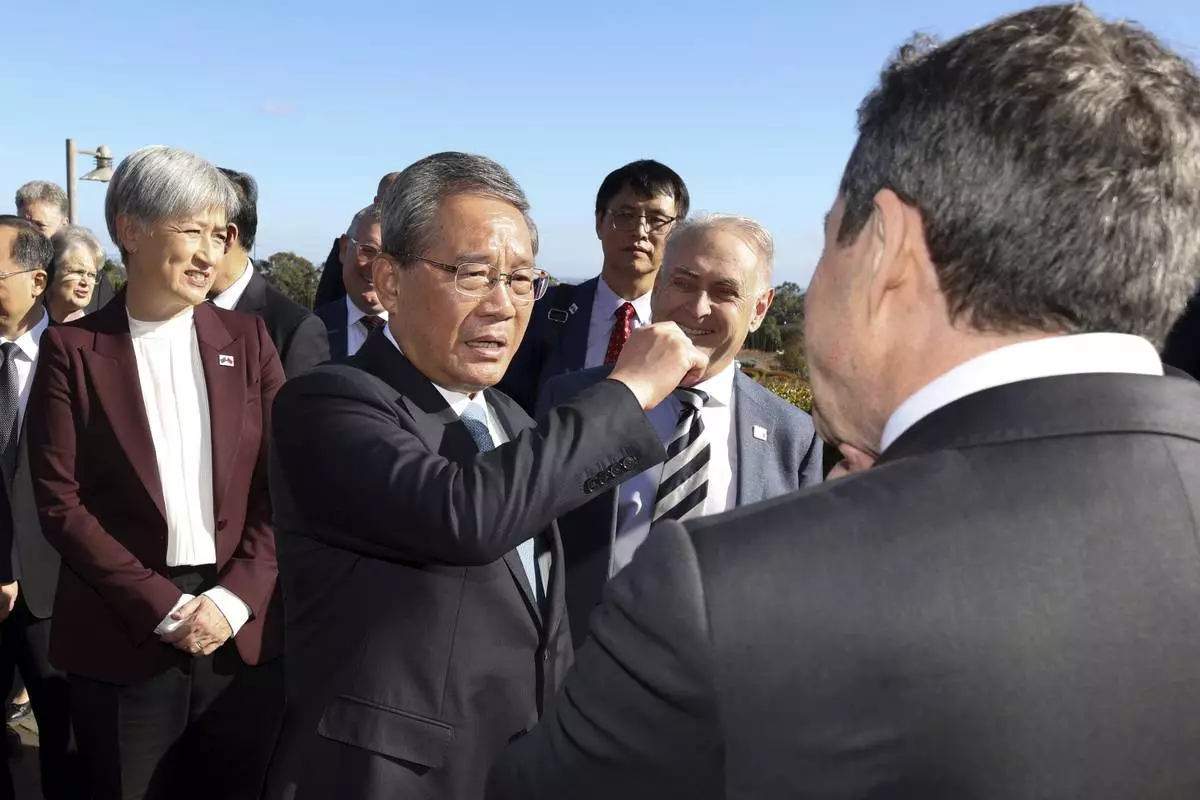
Chinese Premier Li Qiang, center, talks with Penfolds winemaker Peter Gago, right, at Magill Estate winery in Adelaide, Australia, Sunday, June 16, 2024. Li is on a relations-mending mission with panda diplomacy, rock lobsters and China's global dominance in the critical minerals sector high on the agenda during his four-day visit to Australia. (AP Photo/Kelly Barnes, Pool)
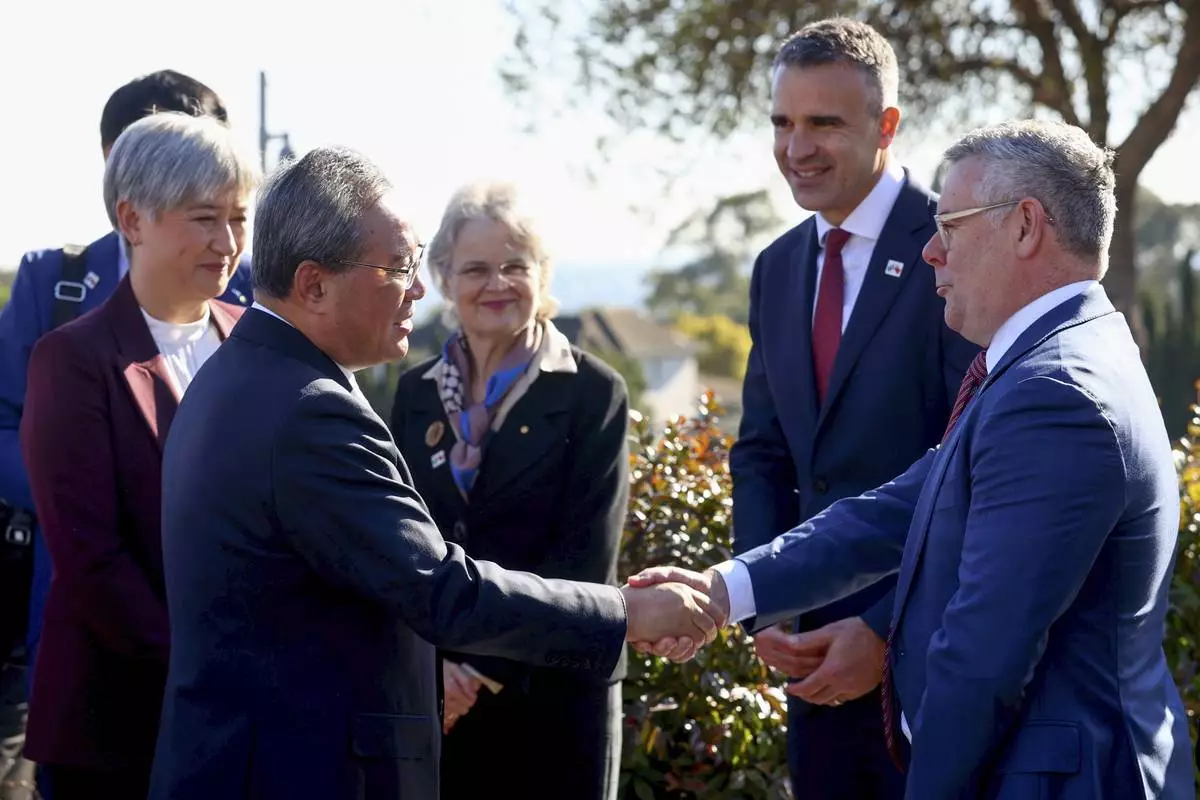
Chinese Premier Li Qiang meets the Minister for Agriculture, Senator Murray Watt, right, at Magill Estate winery in Adelaide, Australia, Sunday, June 16, 2024. Li is on a relations-mending mission with panda diplomacy, rock lobsters and China's global dominance in the critical minerals sector high on the agenda during his four-day visit to Australia. (AP Photo/Kelly Barnes, Pool)
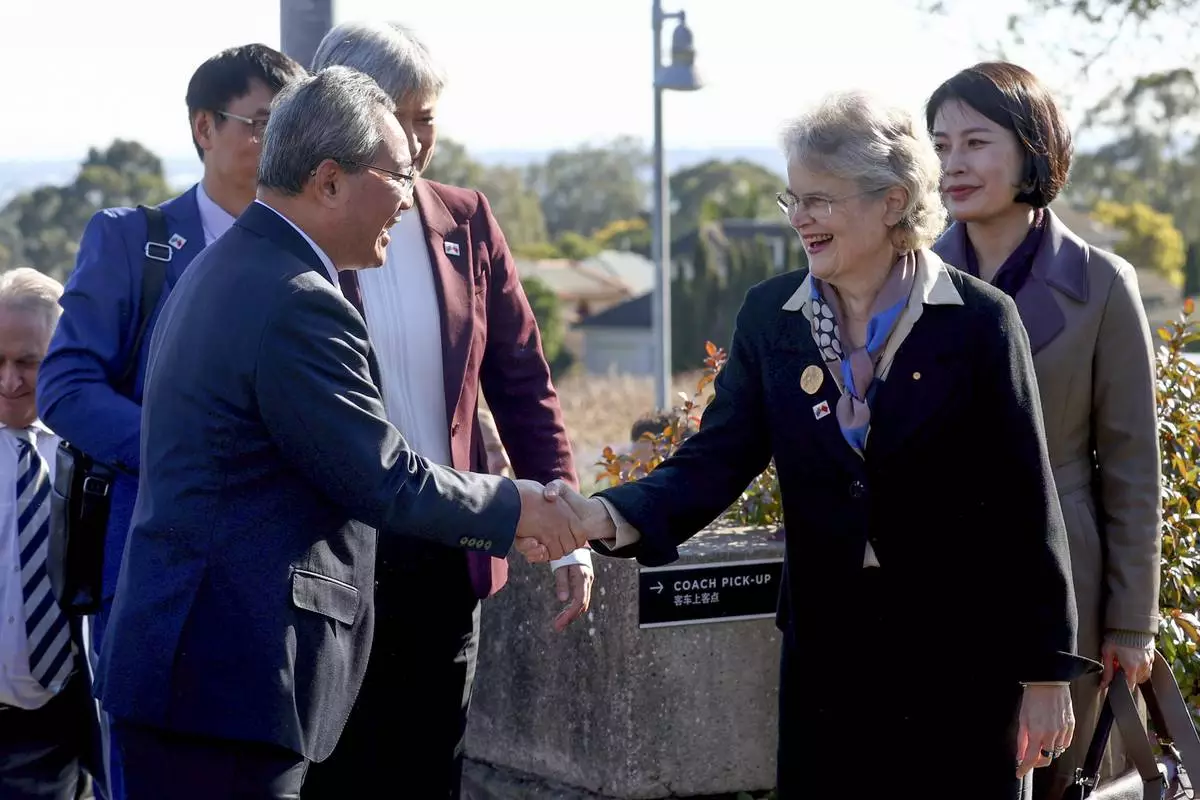
Chinese Premier Li Qiang meets with Governor of South Australia, Frances Adamson at Magill Estate winery in Adelaide, Australia, Sunday, June 16, 2024. Li is on a relations-mending mission with panda diplomacy, rock lobsters and China's global dominance in the critical minerals sector high on the agenda during his four-day visit to Australia. (AP Photo/Kelly Barnes, Pool)
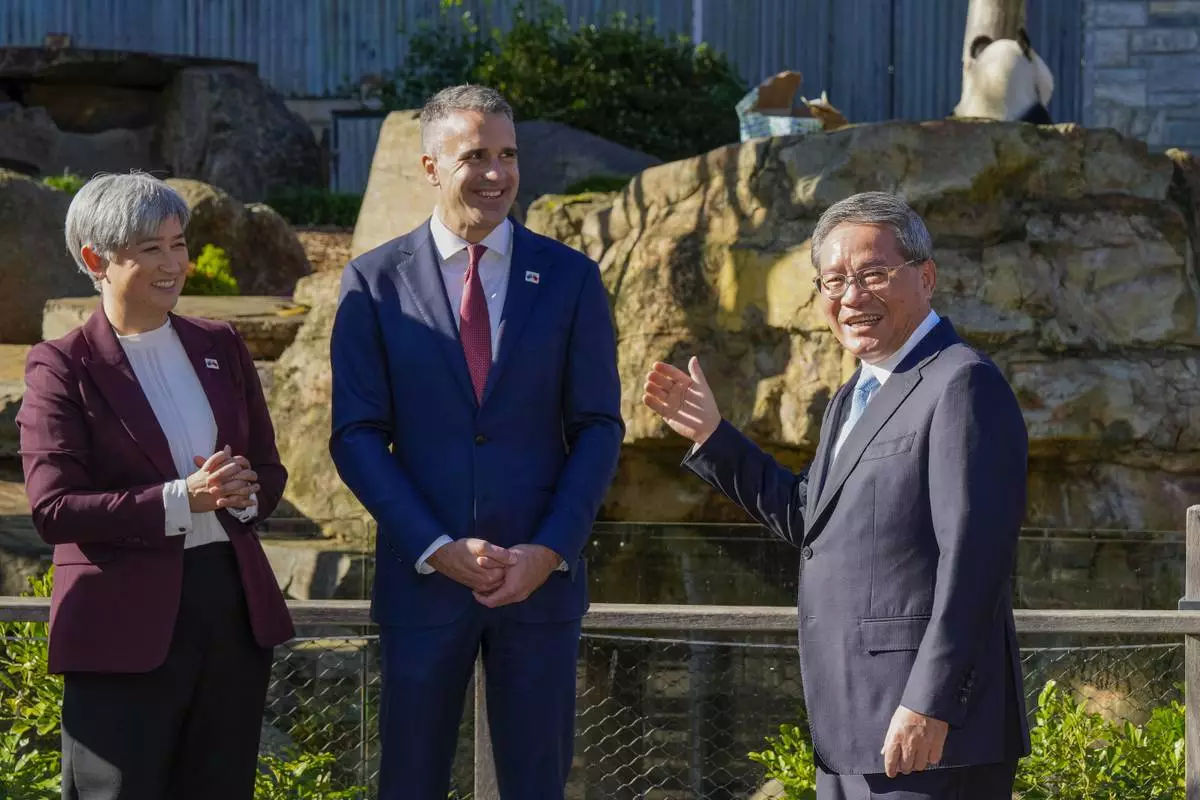
China's Premier Li Qiang, right, gestures as Penny Wong, left, Australia's foreign minister, and South Australian Premier Peter Malinauskas, center, visit Adelaide Zoo, Australia, Sunday, June 16, 2024. Li is on a relations-mending mission with panda diplomacy, rock lobsters and China's global dominance in the critical minerals sector high on the agenda during his four-day visit to Australia. (Asanka Brendon Ratnayake/Pool Photo via AP)
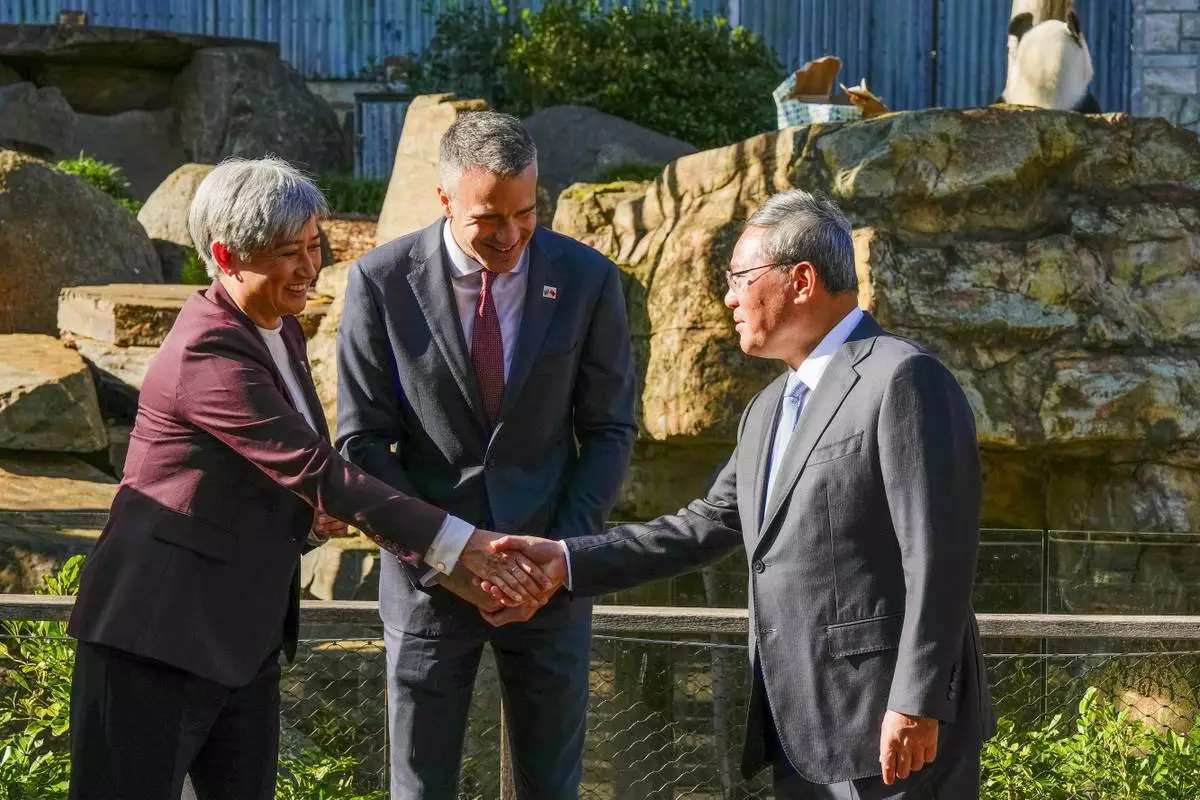
Australia's Foreign Minister Penny Wong, left, shakes hands with China's Premier Li Qiang, right, as South Australian Premier Peter Malinauskas, watches at the Adelaide Zoo, Australia, Sunday, June 16, 2024. Li is on a relations-mending mission with panda diplomacy, rock lobsters and China's global dominance in the critical minerals sector high on the agenda during his four day visit to Australia. (Asanka Brendon Ratnayake/Pool Photo via AP)
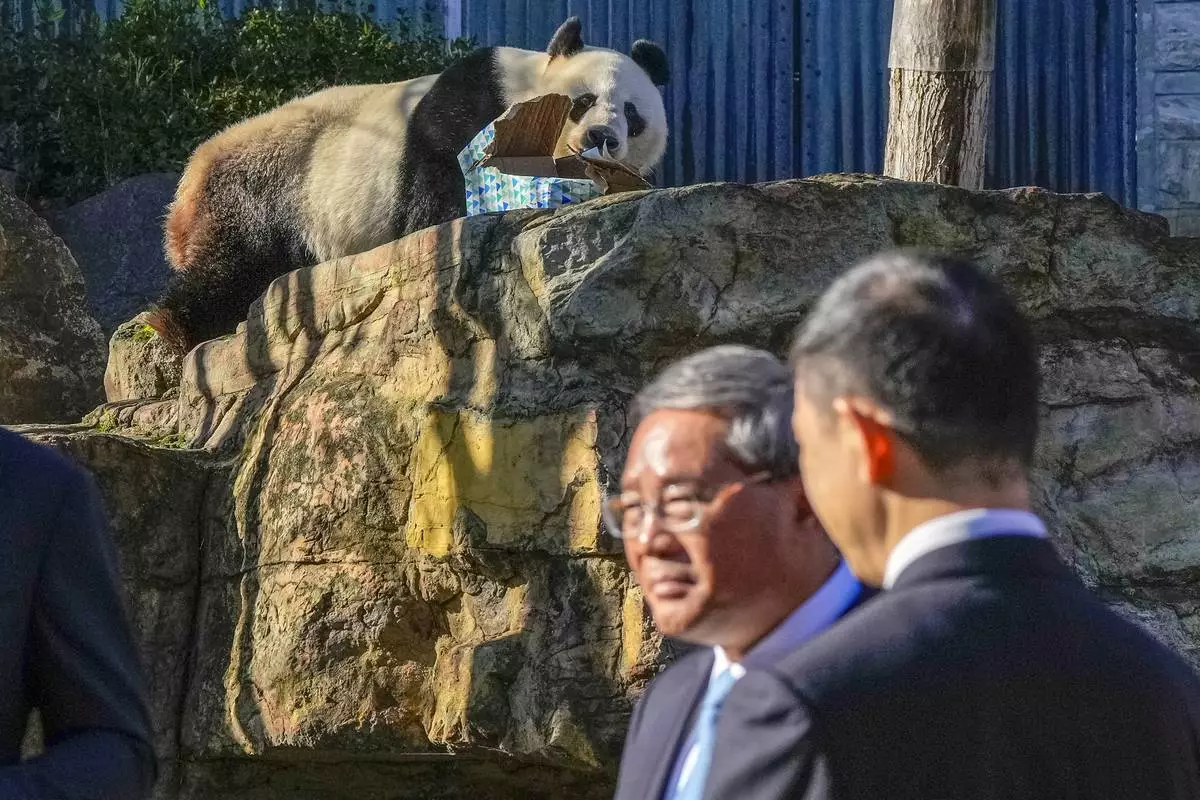
Wang Wang the panda eats from a box in front of Chinese Premier Li Qiang at Adelaide Zoo, Australia, Sunday, June 16, 2024. Li is on a relations-mending mission with panda diplomacy, rock lobsters and China's global dominance in the critical minerals sector high on the agenda during his four day visit to Australia. (Asanka Brendon Ratnayake/Pool Photo via AP)
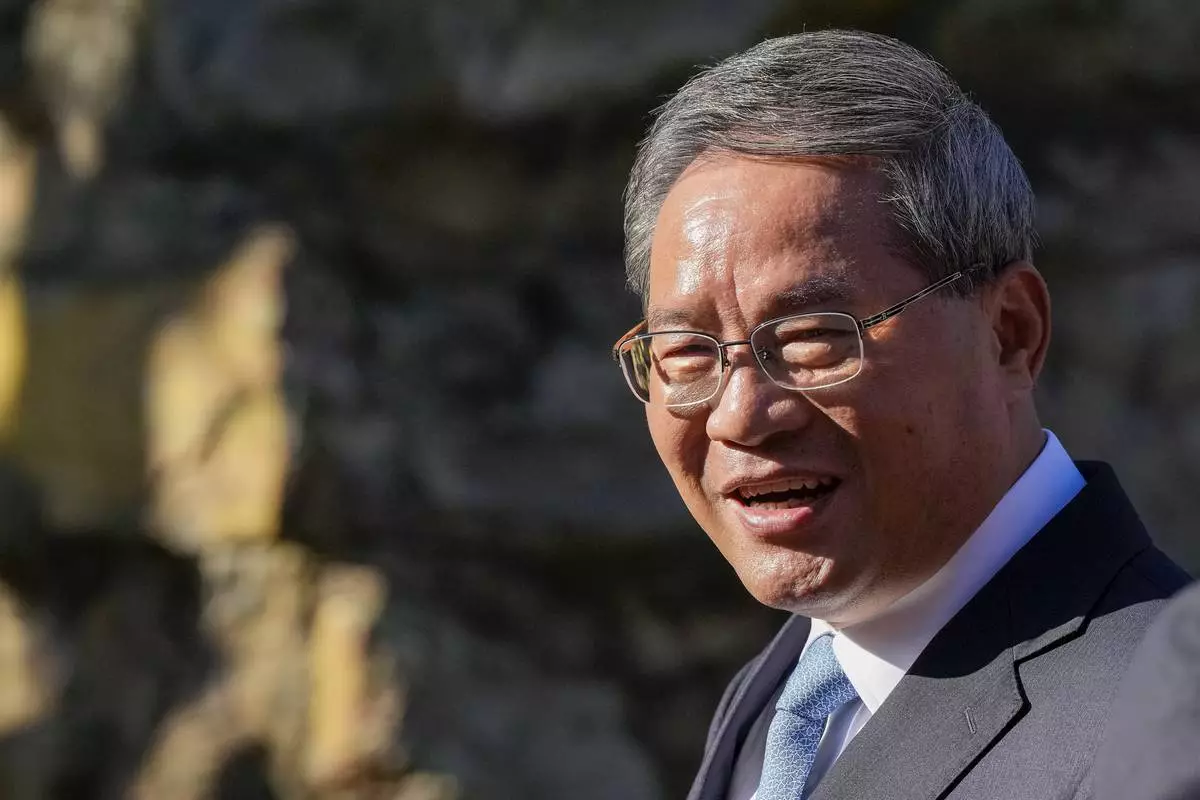
Chinese Premier Li Qiang reacts during a visit to Adelaide Zoo, Australia, Sunday, June 16, 2024. Li is on a relations-mending mission with panda diplomacy, rock lobsters and China's global dominance in the critical minerals sector high on the agenda during his four day visit to Australia. (Asanka Brendon Ratnayake/Pool Photo via AP)




